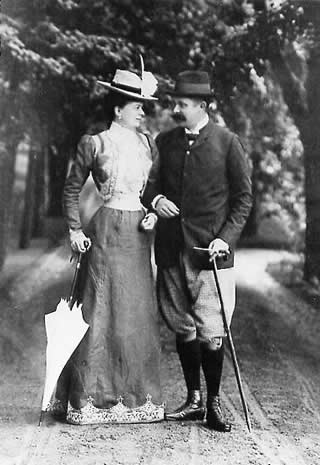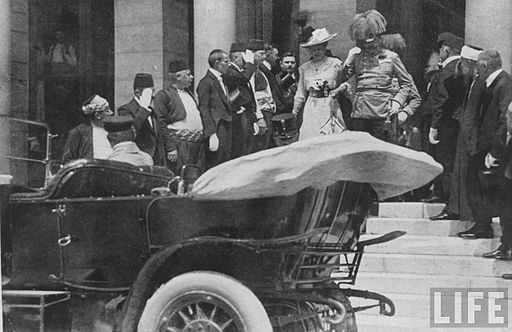100 years ago on June 28 Archduke Franz Ferdinand of Austria was murdered in Sarajevo, launching into motion events that led to The Great War.
Everything about our modern world can, perhaps, be tied back to the assassination of both Archduke Franz Ferdinand and his beloved morganic wife Sophia.
Did it have to happen?
Does it matter?
It happened, the Great War occurred and your life is different as a result. Click to Tweet
(Mine exists; you’ll have to read my post coming up on August 5, 2014 to find out why and how.)
Serbia was a restless part of the Austro-Hungarian kingdom for, oh, about 600 years.
Eleven years earlier, Serbian nationalists broke into the royal palace and killed the ruling King Alexander Obrenović and his wife, Queen Draga, in what became known as the May Coup.

Franz Ferdinand and Sophie
Archduke Franz Ferdinand himself was not well liked in either Austria or Serbia, but he and his wife traveled there anyway on a vacation.
The deeply religious Catholic couple had attended mass that fateful morning and were riding in an open car to the town hall.
A Serbian nationalist threw a pocket bomb at the couple, but the driver saw it coming and swerved to miss. It fell inches behind the royal couple.
Archduke Franz Ferdinand shoved it away and it exploded as the car zoomed away. Several people were injured.
Among the people lining the streets that day were a group of six young men of the “Black Hand” who had traveled to Sarajevo specifically to kill the Archduke. Despondent about missing their chance, they wandered away, one into a tea shop.
Archduke Franz Ferdinand as a good Samaritan?
Archduke Franz Ferdinand and Sophie continued with their planned outing, stopping at the town hall for a ceremonial welcome–the mayor read his script which mentioned how delighted everyone in Sarajevo was about the couple’s visit.
As the doting father of four children, Franz Ferdinand insisted on being taken to the hospital to visit the people injured in the attempted bomb assassination.The Bosnian military governor assured him there would be no further trouble, claiming “if I know anything about the Serb fanatics, they are capable of only one assassination attempt a day.”
Unfortunately, the chauffeur got lost driving them to the hospital. When the governor realized his error, he told the driver to turn around.
The driver shifted gears, but while doing so “in a coincidence that has reverberated down the decades,” according to G. J. Meyer in The Story of the Great War.
He stopped right in front of Gavrilo Princip. The sole unarrested Black Hand assassin and the leader of the gang, pulled out his revolver and fired twice.
He got both Archduke Franz Ferdinand and Sophie. The Archduke cried, “Sophie dear; Sophie dear, don’t die. Stay alive for our children.”
They were both dead within minutes.
Princip died in prison of tuberculosis nearly four years later.
What does Archduke Franz Ferdinand’s death have to do with you? Click to Tweet
More than you know.
The Great War shook up Europe and took a wealthy continent and fire blasted it to ruins. When it finally ground to what the French consider a long cease fire and the Germans regard as the middle of the European Civil War, the Spanish flu killed 50 million people world-wide. Out of those grim ashes came American super power notions as the saviors of the world and ultimately, Adolph Hitler‘s Nazi Germany.
You don’t think any of that affected your life?
I’ve been reading World War I history since February, 2013. It’s a continuing source of agony to read about all the small events that led to the big one.
Kaiser Wilhelm of Germany was on vacation in a Scandinavian fjord and unreachable.
The nervous heads of Europe had treaties requiring them to come to the aid of other nations. Once the Russian tsar called up his reservists, there was no going back–it took a week for them to get into place and in those years of stick telephones and Morse Code telegrams, the soldiers could not be recalled and returned home.
(For another way to understand what happened to start the war, consider If World War I was a bar fight.)
As a result of the Great War:
*the United States became a major player in international affairs–we were an isolationist nation before.
* The center of world banking shifted from London to New York.
* France lost so many men and so much of their industrial capabilities, they had little ability or enthusiasm to fight World War II.
* Reparations resulted in German bankruptcy, thus allowing the National Socialist Party to take over the country within a generation.
* The overthrow of Russia’s weak tsar led to Communism became the ruling power. Communist control ultimately resulted in the Iron Curtain and the Cold War after World War II.
* European colonies were dismantled throughout the world.
* The breakup of the Ottoman Empire resulted in the formation of countries of ethnic groups that didn’t get along–like Iraq. The Brits divided up the Middle East following the end of World War I. (Thanks a lot, Lawrence of Arabia).
* Serbia, Croatia, Slovenia (important to me), Bosnia and Herzogovina became a country called Yugoslavia.
* Anti-semitism rose, ultimately leading to the Holocaust.
You can read an expanded list here.
Would any of the these had happened-if Archduke Franz Ferdinand and Sophie had gone elsewhere on their vacation? Click to Tweet
Unfortunately, we’ll never know.
How did World War I affect your life?







Wow! What an amazing turn of events, Michelle. You have clearly shown how each course of action snowballed into something bigger – and more tragic.
Isn’t is amazing how every thing we do bears a consequence, good or bad?
Absolutely, Jim. You think about that wrong turn and clashing gears and it makes you wonder . . .
WWI actually helped to benefit my life. My great-grandfather, a British soldier, was wounded and made a prisoner of war. When he finally returned, after the war, to England his health was still bad. He turned for comfort to a friend of his sisters, asking her if she would marry him when he recovered. Her reply, “Why don’t I marry you now and take care of you.” So they were married. As a returned veteran, he was given training in a trade – watchmaking – and he went to Canada looking for a new life. So if the war had never happened, a branch of my family might never have come to Canada, where the other three branches already were.
I have a similar story I’ll tell in August. My grandfather was in the American army, got sick with spinal meningitis and didn’t join his unit when they sailed, and died, in France.
I hope your great-grandmother was as wonderful as she sounds to her Tommie!